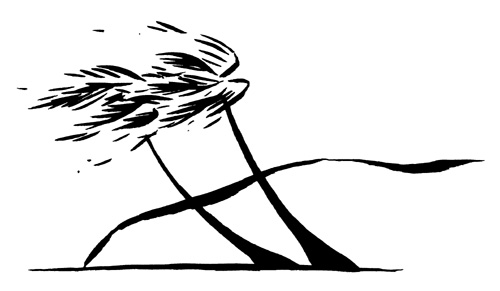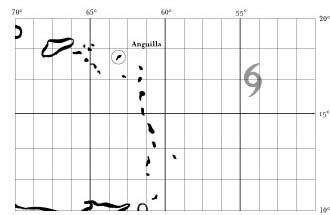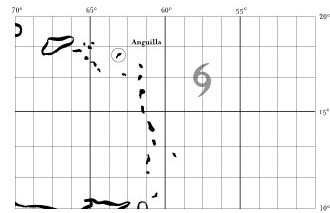A Trip to the Beach (25 page)
I leaned on the railing and took a long, deep breath of the cool morning air. The sound of the waves below would seem far away in Vermont. I tried to plant the view, the breeze, and the gentle, repetitive swoosh of the surf firmly in my mind; we closed the door and drove away.
At the top of the hill above our apartment I glanced over my shoulder for one last glimpse of the turquoise water beyond. We passed Lowell's house and waved goodbye to his mother, who was standing on her porch in her housedress. We drove by Christine's shop on the left, and as we eased over the speed bump in front of Bernice's, I could almost smell the barbecue.
The next barbecued chicken we would have would be at a fair in Vermont. I wondered if the pace in Vermont would seem fast to me now. Had I become so much a part of this new lifeâthis gentle Caribbean lifeâthat even Vermont would seem harried to me now?
Garrilin, Roxana, and Mac were waiting for us at the airport to say goodbye. We unloaded the luggage, parked the truck in the lot, slid the keys under the mat for Lowell, and checked in at the counter. As we said goodbye and paid our “non-belonger's” departure tax, I thought,
I can't think of a place I belong to more than Anguilla.
Chapter 14

Lowell's call came on Sunday, September 3, at three in the afternoon. “Mel,” he said with no preamble, “you see the Weather Channel?” I could hear panic in his voice.
“No,” I answered. “Why? What's going on?”
“Man, this is the big one. I ain' never see nothin' like this
ever.
Hurricane Luis, man. He headed straight for us. Luis gonna mash us up, man. I gonna get the rest a the guys and bar up the restaurant. We ain' got much time.”
“I'll go turn on the TV,” I said, and handed the phone to Bob.
“Hey, Bob,” Lowell said in a hurry. “This storm ain' makin' no joke. I jus' wanted to tell you we already buy plywood from Anguilla Trading an' we barrin' up all the shutters and doors at the restaurant. Me an' Clinton roundin' up the rest a the guys.”
“I'm coming down,” Bob said. “Let me see how soon I can get a flight. You put on the plywood, and I'll call you as soon as I know my schedule.”
Jesse had already returned to school, and Bob and I were staying at Pat's house in Vermont. I turned on the Weather Channel, and sure enough, all they were talking about was Hurricane Luis. And the white line showing its projected path went straight through Anguilla and St. Martin.
SEPTEMBER 3â3 p.m. TROPICAL UPDATE
Location: 54.90 WÂ Â Â Â Â Â 17.40 N
Sustained winds 135 mph
Gusts up to 145 mph
Category 4 hurricane
Moving 12 mph WNW
500 miles from Anguilla/St. Martin
Predicted landfall: 40 hours

Bob, Pat, and I were glued to the Weather Channel, getting a quick lesson in tropical meteorology. John Hope, the channel's hurricane specialist, told us that the storm had been first detected nine days earlier as a tropical disturbance swirling off the coast of Africa. It was heading directly for the northeastern Leeward Islands. Four days later it strengthened to a tropical storm, and two days after that a well-defined eye formed, winds increased to 75 mph, and Luis turned into a category 1 hurricane. It took only three more days to turn into a category 4 storm, with sustained winds of 135 mph.
SAFFIR-SIMPSON DAMAGE POTENTIAL SCALE
| Category | Wind | Predicted Damage |
| 1 | 74-95 mph | Minimal |
| 2 | 96-110 mph | Moderate |
| 3 | 111-130 mph | Extensive |
| 4 | 131-155 mph | Extreme |
| 5 | 155+ mph | Catastrophic |
Flights to Anguilla were canceled because they were moving all the smaller American Eagle planes out of the region. Bob booked a flight to St. Martin for early the next morning and called Frankie Connor, who said he would meet him at the dock by the airport with his boat. Pat and I drove Bob to Boston that night and made him promise to keep in touch.
John Hope fast became our only link to the storm's progress. He had a new report every three hours, with updates on the projected path of the storm, changes in wind velocity, and the speed at which it was moving. We learned that a hurricane's forward motion could slow down, in which case it would strengthen even more.
I called Bob at his hotel in Boston and asked him not to go. John Hope was warning people in the islands to put together hurricane emergency kits with drinking water, canned foods, batteries, flashlights, and radios. “Bob, how can you fly down there knowing how dangerous it is? This is crazy. Let me come back to Boston and get you.”
“I'll be fine. My flight gets in at one o'clock, Frankie will pick me up, and I'll be safe in our apartment. It's very well built, and we'll board up all the windows. Nothing can happen. I want to be there to help Lowell and Clinton get everything ready, and I think it's a good idea for me to be there afterward to help do whatever has to be done.”
“But this is your life we're talking about. As Lowell said, this storm ain' makin' no joke.”
“Mel, stop worrying. I'll be fine.”
SEPTEMBER 4â5 a.m. TROPICAL UPDATE
Location: 57.40 WÂ Â Â Â Â Â 17.00 N
Sustained winds 138 mph
Gusts up to 150 mph
Eye is continuing to develop
Intensification expected
Category 4 hurricane
Moving 12 mph WNW
350 miles from Anguilla/St. Martin
Predicted landfall: 30 hours

At six the following morning Bob was with a sleep-deprived crowd at an American Airlines gate at Logan Airport. People were becoming unruly, and his voice grew louder as his patience was running out. He had become the spokesman for the rest of the passengers, and they were waiting for a supervisor to announce whether or not the flight to St. Martin would be canceled.
“Look,” he said to Mr. Whitfield, the ticket agent at the counter, “we are all confirmed on this flight and have to get down there. If that plane doesn't go, we could lose everything we have.”
“Sir, we're trying to get an updated position on the hurricane,” Mr. Whitfield said as he frantically punched keys on his computer. Bob was convinced he was staring at the computer screen to avoid making eye contact with the customers. Another gate agent had already announced that the tower was calculating how bad the weather would be when the plane landed in four hours.
Bob pressed on. “With only about forty people on that jumbo jet, this is obviously not a profitable trip for American Airlines. But this is our livelihood. We have to get down there to protect our property. The hurricane is still two hundred and fifty miles east of St. Martin and moving at twelve miles an hour. It's easy math. The storm won't hit the island until tomorrow,” Bob said. He had just seen the latest tropical update on a TV in his hotel before checking out, and wondered if Mr. Whitfield expected to find information in his computer that was somehow more current.
Most of the other passengers, like Bob, had interests in St. Martin or one of the surrounding islands such as Anguilla or St. Barts. They were trying to reach their little piece of paradise and secure it against the oncoming storm. The only tourists were a group of four Germans who spoke absolutely no English and apparently had not heard about Hurricane Luis, and a young honeymooning couple who thought they were in for a great adventure. Bob paced the room for another half an hour wondering how much it would cost if everyone chipped in to charter a plane.
“May I have your attention, please?” Mr. Whitfield had stopped punching his keyboard and spoke into the microphone. “American Airlines announces the boarding of flight five-sixty-one to St. Martin. Passengers in first class and those needing assistance or traveling with small children may now board through gate seventeen.”
“Does he see anyone here taking small children on vacation into a hurricane?” Bob said to a man standing next to him. “We're probably crazy enough going down ourselves.”
The flight was uneventful and quiet. Passengers were lost in their own thoughts about what they would encounter in the hours to come.
As the huge, empty plane began its approach into St. Martin, the captain's voice came over the intercom. “Well, folks, it looks like the landing could be a little rough today.” He didn't sound as confident as Bob would have liked. “The storm is still a ways away, but we've got some pretty stiff gusts of wind, so please make sure your seat belts are fastened. I'll try to make it as smooth as possible.”
When the plane touched down, it somehow seemed to be moving sideways. It bounced a couple of times, the engines roared, and the big bird careened down the runway, coming to a stop not fifty feet from the end of the tarmac. The pilot turned the plane around, and as it lumbered back toward the Princess Juliana Airport terminal, Bob stared out the window, trying to imagine what the scene would be like in twenty-four hours. Pummeled by the wind, the palm trees already looked like inside-out umbrellas, and the storm hadn't even arrived yet.
Inside, the terminal was complete mayhem. The hot breeze brought no relief as more than a thousand people desperately tried to get a ticket for the last departing plane outâwhich held only three hundred passengers. The airport was about to be shut down. Tickets and boarding passes were being sold auction style by a large local woman standing on a chair surrounded by a jostling, clamoring crowd, and the bidding was up to $2,000 per ticket. As Bob pushed his way through the mob, dragging his bag behind him, he wished he had stayed up north.
Outside the terminal, the wind was unrelenting. He leaned into the gale and headed across the road, where he had arranged to meet Frankie's boat to take him over to Anguilla. Rays of sun streaked down between the dark clouds and sparkled on the water.
This is so strange,
Bob thought.
The worst hurricane in thirty-five years is about to hit us head-on, and the water is the most incredible shade of green I have ever seen. How can it be so beautiful in the middle of such a disaster?
The small wooden dock where Frankie's boat tied up belonged to a grocery store and restaurant that serviced the sailing crowd. The owners of the little complex were busy boarding up their windows. Bob heard hammers pounding from all directions and remembered how peaceful it had been in that same spot so many times before. Rounding the corner, he saw two teenage boys wrestling with a piece of plywood. They were trying to nail it over a window in the store, and the wind kept wrenching it away from them.
Bob's heart sank as he looked up and down the dock and realized Frankie's boat was not there.
“You guys seen Frankie Connor?” he asked, hoping they would say he'd be right back.
“Frankie gone,” one of them replied. “Ports all close.”
“Does that mean the regular ferries aren't running either?”
“No, man. Everything close. See ferries out there.” The young man stopped fighting with the plywood for a minute and pointed toward the harbor, where a group of Anguilla ferryboats was anchored, preparing to ride out the storm.
Okay,
Bob thought,
I'll just go back to the airport and call Frankie. He'll come get me.
The line for the two telephones in the terminal was at least fifty people long, so Bob quickly returned to the store, hoping to use the phone there. He went inside to ask for the phone and waited patiently in the checkout line behind an angry man who was cursing at the owner. The customer was stocking up on supplies, and prices had doubled with the impending hurricane.
“You a wicked son of a bitch, Mitchell. These prices ain' right,” the customer protested.
“James, you gonna buy this stuff or not?” the storekeeper asked with his arms crossed.
James reluctantly threw some money on the counter, muttering, “Greedy son of a bitch.”
Mitchell didn't seem to mind being called names, and as he turned to Bob it was obvious he would not let him use the phone without some form of remuneration.
“I have a little problem,” Bob began as Mitchell turned and headed for the door to check on the progress of his two young assistants.